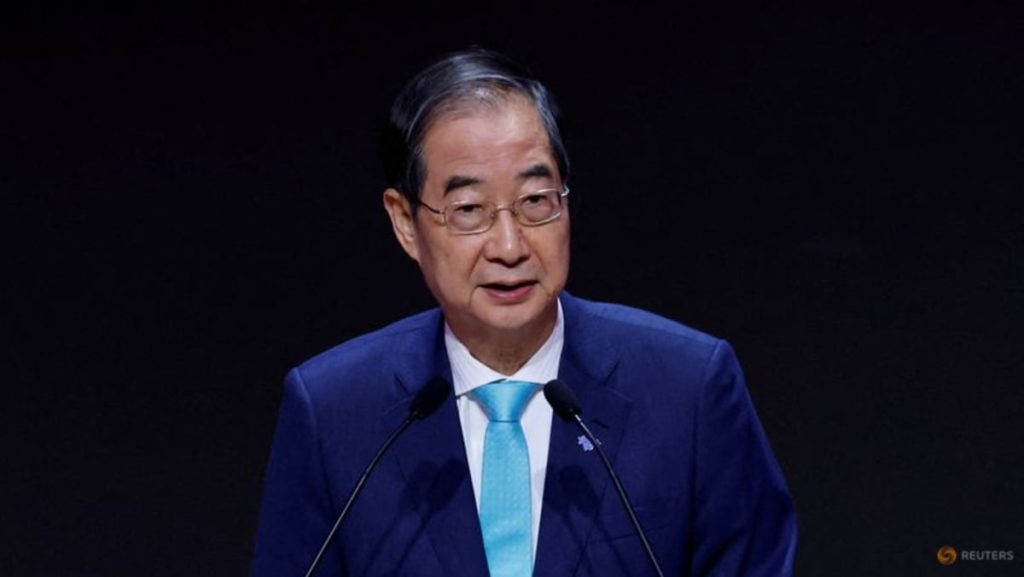The political landscape of South Korea is on the precipice of a historic event, with the opposition Democratic Party initiating impeachment proceedings against Acting President Han Duck-soo. The catalyst for this unprecedented action is Han’s refusal to formally appoint three judges to the Constitutional Court, a move the Democratic Party interprets as a blatant disregard for the constitution and a calculated maneuver to obstruct the potential impeachment of suspended President Yoon Suk-yeol. This intricate political chess match revolves around the precarious balance of power between the ruling People Power Party and the opposition, highlighting the significant influence of the Constitutional Court in South Korean politics. The Democratic Party argues that Han’s actions demonstrate an unwillingness to uphold the constitution, a fundamental requirement for his position, thereby justifying the drastic measure of impeachment.
Han’s decision to withhold the appointment of the three judges has created a critical impasse in the Constitutional Court, effectively paralyzing its ability to function at full capacity. This has profound implications for the ongoing impeachment process against President Yoon, who was suspended from office in March 2023 following corruption allegations. The court, responsible for adjudicating the impeachment trial, now faces a procedural hurdle due to the vacant judgeships. Without these appointments, the court’s ability to reach a decision on Yoon’s fate is significantly hampered, potentially leading to a protracted legal battle and further political instability. The Democratic Party contends that Han’s actions are a deliberate attempt to manipulate the impeachment process, ensuring a favorable outcome for the suspended president.
The Democratic Party’s floor leader, Park Chan-dae, has publicly denounced Han’s refusal to appoint the judges, emphasizing that it underscores his unsuitability for the role of acting president. The party’s stance hinges on the argument that Han’s actions violate the spirit and letter of the Constitution, undermining the integrity of the judicial process. They assert that by obstructing the appointment process, Han is effectively hindering the Constitutional Court from fulfilling its constitutional mandate, thus jeopardizing the delicate balance of power within the South Korean government. The Democratic Party’s decision to pursue impeachment is a clear indication of their determination to hold Han accountable for what they perceive as a gross dereliction of duty.
Han, on the other hand, defends his position by asserting that the appointment of Constitutional Court judges requires a consensus between the ruling and opposition parties. He argues that such appointments, due to their significant impact on the legal and political landscape, necessitate a broad-based agreement to ensure impartiality and avoid accusations of political maneuvering. Han maintains that his actions are not a defiance of the Constitution, but rather an adherence to the principle of collaborative governance, ensuring that such crucial appointments reflect the will of the people as represented by both the ruling and opposition parties. This justification, however, has failed to appease the Democratic Party, who view it as a thinly veiled attempt to stall the impeachment process and protect President Yoon.
The potential ramifications of this political standoff are substantial. If the Democratic Party succeeds in impeaching Han, it would be an unprecedented event in South Korea’s democratic history. The removal of an acting president would send shockwaves through the political establishment and create a period of significant uncertainty. Finance Minister Choi Sang-mok would assume the role of acting president, adding another layer of complexity to the already turbulent political climate. This scenario highlights the high stakes involved in the current power struggle and the potential for further political upheaval in the coming days.
The impeachment motion against Han is scheduled for a vote in the National Assembly. The outcome of this vote will determine the immediate future of South Korean politics. A successful impeachment would not only remove Han from office but also potentially reshape the political landscape, influencing the ongoing impeachment proceedings against President Yoon and potentially triggering a snap election. The vote will be a crucial test of the Democratic Party’s strength and their ability to garner the necessary support to remove Han. The political maneuvering and lobbying efforts in the lead-up to the vote will be intense, as both sides attempt to sway undecided lawmakers and secure the outcome they desire. The future of South Korean politics hangs in the balance, with the impeachment vote serving as a pivotal moment in this ongoing power struggle.

